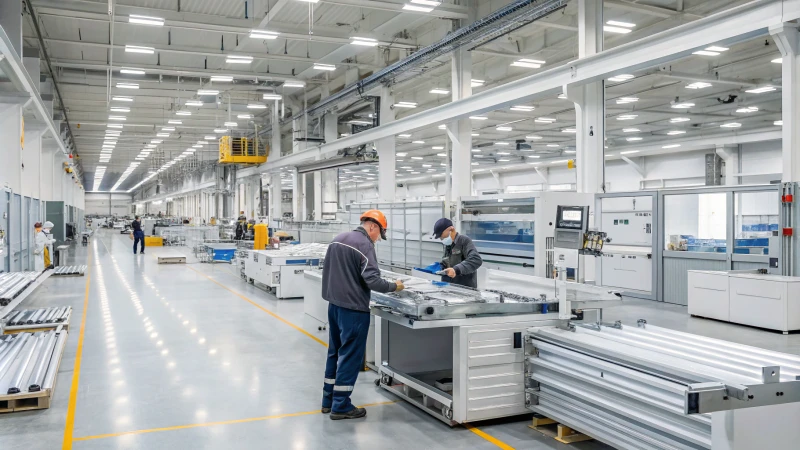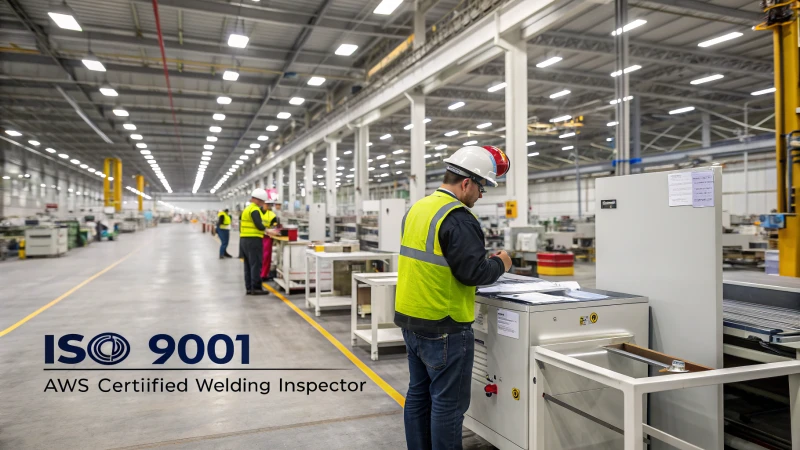
Finding the right aluminum door and window manufacturer can make or break your construction project.
To find a reputable aluminum door and window manufacturer, prioritize their experience, quality control systems, and customization capabilities. Look for ISO certifications and modern machinery to ensure product reliability. Strong post-production support and competitive pricing are also essential for a successful partnership.
In this post, we will delve deeper into essential strategies to identify the best manufacturers, along with tips that can help you navigate the complexities of procurement.
What Qualities Should You Look for in a Manufacturer?
Selecting the right manufacturer is crucial for your business success. Here’s a comprehensive guide on what qualities to prioritize when evaluating potential manufacturing partners.
When choosing a manufacturer, focus on their industry experience, quality control systems, ability to handle custom orders, advanced technology, customer service, and transparent pricing. These factors are essential for a successful B2B partnership.

Proven Track Record in the Industry
When looking for a manufacturer, experience is paramount. A manufacturer with a long history in the field can often provide you with the necessary skills to meet your needs.
- Experience Matters: Longevity in aluminum extrusion ensures they have refined processes.
- Case Studies: Ask for references from past projects that resemble your requirements.
For instance, a manufacturer that has worked extensively with high-end residential projects likely understands quality and design nuances better than a newer entrant.
Quality Control Systems
Quality assurance is crucial in manufacturing. Consider these factors:
- ISO Certifications: Look for standards like ISO 9001, which indicate rigorous quality management systems.
- In-house Testing: Manufacturers with their own testing facilities can provide insights into product durability, ensuring you receive reliable materials.
Ability to Handle Custom Orders
Flexibility can be a game-changer. Ensure your manufacturer can:
- Accommodate Custom Profiles: Aluminum products are often tailored to specific needs.
- Provide Prototyping Services: Ask about their CAD capabilities and how they handle sample production.
Technology and Machinery
The machinery used by a manufacturer speaks volumes about their capabilities:
- Modern Equipment: Confirm that they utilize up-to-date extrusion and CNC machinery.
- Production Automation: Automated lines can enhance consistency and reduce lead times.
Post-Production Support and Customer Service
After-sales support can make or break a partnership:
- Comprehensive Services: Look for manufacturers who assist with assembly and delivery.
- Responsive Communication: Gauge their communication speed and clarity during initial conversations.
Pricing Structure and Lead Times
Finally, consider the financial aspects:
| Criteria | What to Look For | Why It Matters |
|---|---|---|
| Transparent Pricing | Clear cost breakdown | Avoid hidden fees that inflate costs |
| Realistic Lead Times | Feasible delivery schedules | Ensures timely project completion |
| Competitive Pricing | Fair market rates | Allows for better budgeting |
How Important is Environmental Sustainability in Manufacturing?
In today’s manufacturing landscape, environmental sustainability is becoming increasingly vital. Understanding its significance can unlock numerous benefits for businesses.
Environmental sustainability in manufacturing is essential for cost savings, regulatory compliance, consumer demand, and innovation. It enables businesses to reduce waste, lower costs, and enhance their brand reputation.

The Rising Significance of Environmental Sustainability in Manufacturing
Environmental sustainability is no longer just a buzzword in manufacturing; it has become a critical component of operational strategies.
One major aspect of sustainability in manufacturing is the reduction of waste. Implementing practices like lean manufacturing helps organizations minimize excess production.
Companies can leverage waste reduction techniques to streamline their processes and cut costs.
Cost Savings through Sustainable Practices
| Initiative | Initial Investment | Estimated Annual Savings | Payback Period |
|---|---|---|---|
| Energy-efficient equipment | $50,000 | $12,000 | 4.2 years |
| Waste recycling programs | $10,000 | $3,000 | 3.3 years |
| Water conservation systems | $25,000 | $6,000 | 4.2 years |
Regulatory Compliance and Risk Mitigation
Stricter regulations around emissions and waste management require proactive compliance.
Consumer Demand for Sustainable Products
Sustainability is a growing priority for consumers. Companies that embrace eco-conscious practices enjoy increased brand loyalty and market share.
Innovation and Competitive Advantage
Sustainability encourages innovation and positions your business as forward-thinking. It fosters new methods and technologies that can offer significant competitive edges.
What Role Does Customer Service Play in Choosing a Supplier?
Customer service plays a pivotal role in choosing a supplier by ensuring reliability, enhancing trust, and improving communication. Exceptional service fosters long-term partnerships, leading to operational efficiency and satisfaction in B2B relationships.

The Importance of Customer Service in Supplier Relationships
- Trust and Reliability: Proactive communication builds strong trust.
- Responsive Communication: Promotes smoother operations and faster issue resolution.
Customer Service as a Competitive Advantage
| Supplier Characteristics | Impact on Decision |
|---|---|
| Quick response times | Increased trust |
| Personalization of service | Better customer satisfaction |
| Proactive problem-solving | Lower operational risks |
- Long-Term Partnerships: Suppliers who invest in customer service often enjoy longer relationships with clients.
Impact on Supply Chain Efficiency
- Issue Resolution: Fast responses minimize downtime.
- Feedback Loop: Creates opportunities for continuous improvement.
Evaluating Customer Service During Supplier Selection
- Response Time
- Communication Skills
- Support Services
- Flexibility
- Customer Reviews
Are There Specific Certifications You Should Consider?
Certifications such as ISO 9001, ISO 14001, and AWS Certified Welding Inspector are valuable for professionals in aluminum manufacturing. They enhance credibility, demonstrate expertise, and open up new career opportunities.

Understanding the Importance of Certifications
Relevant certifications validate your expertise:
- ISO 9001: Quality management
- LEED Accreditation: Sustainable construction
Certifications Relevant to Aluminum Manufacturing
| Certification | Description | Benefits |
|---|---|---|
| ISO 9001 | Quality management systems | Enhances product quality and satisfaction |
| ISO 14001 | Environmental management systems | Demonstrates commitment to sustainability |
| AWS Certified Welding Inspector | Validates welding inspection skills | Increases credibility |
How to Choose the Right Certification?
- Relevance to career goals
- Industry demand
- Ease of obtaining
Networking Through Certifications
Certifications provide access to exclusive communities, events, and forums that can enhance your career development.
How Can You Verify a Manufacturer’s Reputation?
To verify a manufacturer’s reputation, research online reviews, check certifications, conduct background checks, visit facilities, engage in direct communication, and seek recommendations from industry peers.

1. Research Online Reviews and Ratings
Use platforms that collect customer feedback to evaluate manufacturer performance.
2. Check Industry Certifications and Standards
| Certification | Description | Importance |
|---|---|---|
| ISO 9001 | Quality management systems | Ensures consistent improvement |
| ISO 14001 | Environmental management | Indicates sustainability practices |
| CE Marking | Safety and health compliance (Europe) | Required for EU market |
3. Conduct Background Checks
Assess financial health, legal compliance, and past client relationships.
4. Visit the Manufacturing Facility
Observe:
- Equipment
- Workforce skills
- Safety protocols
5. Engage in Direct Communication
- Ask detailed questions
- Evaluate response time
- Assess honesty and clarity
6. Seek Recommendations from Industry Peers
Network within your industry to find trusted manufacturers through firsthand experiences.
Conclusion
Learn how to select a reputable aluminum door and window manufacturer by evaluating their experience, quality control, customization options, technology, support services, pricing transparency, and customer service.











